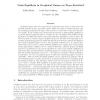294 search results - page 9 / 59 » The complexity of computing a Nash equilibrium |
125
click to vote
GLOBECOM
2008
IEEE
15 years 8 months ago
2008
IEEE
— We consider the issue of fair share of the spectrum opportunity for the case of spectrum-overlay cognitive radio networks. Owing to the decentralized nature of the network, we ...
102
click to vote
ATAL
2007
Springer
15 years 7 months ago
2007
Springer
Agents engaged in noncooperative interaction may seek to achieve a Nash equilibrium; this requires that agents be aware of others’ rewards. Misinformation about rewards leads to...
FSTTCS
2009
Springer
15 years 8 months ago
2009
Springer
We suggest that extending Muller games with preference ordering for players is a natural way to reason about unbounded duration games. In this context, we look at the standard solu...
106
click to vote
SIGECOM
2006
ACM
15 years 7 months ago
2006
ACM
Graphical games have been proposed as a game-theoretic model of large-scale distributed networks of non-cooperative agents. When the number of players is large, and the underlying...

